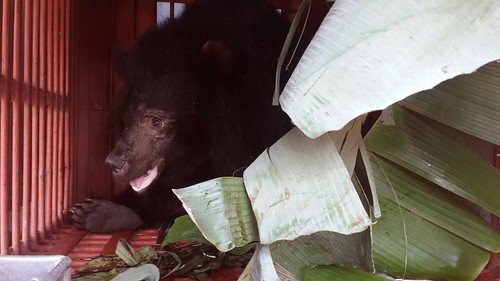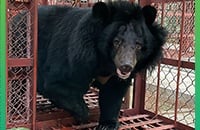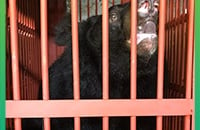Ten days we’ll never forget – two bears rescued, 68 moved and now space for 40 more
25 April 2017
It started with just two precious bears being freed from years of agonising captivity and ended with 68 others exploring their grassy new forever homes.
On April 11, an Animals Asia rescue team arrived in Dak Lak to rescue moon bears Bazan and Wendles from a decade of suffering on a bear bile farm.
As with all bile farm rescues, it was a huge operation with veterinary and logistics teams ready for the unexpected and bracing themselves for the worst.
Once freed, the two bears would begin an arduous three-day road trip up Vietnam’s coast to Animals Asia’s Vietnam Bear Rescue Centre.
It was here, more than 1,000km away, that another huge operation was being undertaken at the very same time.
To make space for the new arrivals and maximise sanctuary space for future rescues, an astonishing 68 moon were being moved.
The move had begun on Monday and would take three days of constant action – coaxing bears to willingly begin the unfamiliar journey, wheeling the majestic animals to their new homes and making sure everything ran smoothly.
The sheer volume of bears being moved in transport cages and the animals’ mighty weight meant it was backbreaking work, but the sanctuary team kept on pushing.
Three days later, the last of the bears were safely in their new dens just 48 hours before the rescue truck, carrying precious Bazan and Wendles, triumphantly passed through the sanctuary gates.
For this long-suffering couple, that moment was the end of 12 years of agony.
Every day they had woken to the same cage. Every day they could not run, climb, explore or even eat the food bears are meant to eat. The cage was their life, a life punctuated only with periodic and painful bile extraction. Finally, that life was over.
On the long journey home, Bazan and Wendles had been introduced to the first acts of kindness they had ever known. Delicious and healthy food, long denied them, was lovingly prepared, leaves were foraged so that they could nest and be more comfortable and they had access to all the thirst-quenching water they could ever desire.
Over the next few days, both girls began to settle into their quarantine period and duly commenced charming their new carers.
Animals Asia’s Bear Manager Kelly Donithan said:
“Both Bazan and Wendles settled in very nicely to quarantine and have very quickly learned to trust us – which is amazing considering how much they’ve suffered.
“Wendles is constantly curious and has a real sparkle in her eyes. She has been enjoying playing with some of the toys we’ve provided for her and is generally very alert and eager to explore her new surroundings.
“Bazan is very particular about where she places her paws and daintily avoids stepping on the leaves we’ve provided to make her more comfortable, but it won’t be long till all the unfamiliar sights, smells and touches of the natural world become second nature to her again.”
By the time Bazan and Wendles were beginning to feel comfortable in their new homes, 10 amazing days were capped off as Animals Asia announced the opening of the final double bear house enclosure at the sanctuary on April 19.
The new building will provide space for up to 40 more bears to be rescued from bear bile farm cruelty – raising the facility’s potential capacity to nearly 200 – and marks the last stage in the sanctuary’s decade-long development.

Animals Asia’s Founder and CEO, Jill Robinson MBE said:
“What an incredible 10 days it has been. I can scarcely believe how much has been achieved. Bazan and Wendles’ lives have been changed forever and their suffering has finally come to an end. Now that the new bear houses are finished, we’ve also paved the way to change the lives of so many more bears and can’t wait to get out there and free more of them from misery.
“It’s been such a whirlwind period and has happened so fast that we’ve barely had time to appreciate what has been accomplished. The legacy of these 10 days will continue for decades and has laid the foundations for cruelty-free lives for nearly 200 animals. Everyone involved – staff and supporters – should be immensely proud.”
BACK








 Freedom after two decades: Moon bears Nang and Mua rescued
Freedom after two decades: Moon bears Nang and Mua rescued
 With heavy hearts we say goodbye to our beloved Tulip
With heavy hearts we say goodbye to our beloved Tulip
 Three moon bears rescued from notorious bear bile farming hotspots in Vietnam
Three moon bears rescued from notorious bear bile farming hotspots in Vietnam